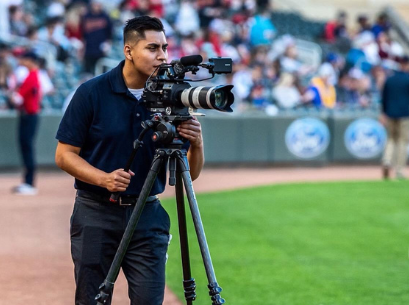New academic pathways in LAS
Author: lskramer
Author: lskramer
The College of Liberal Arts and Sciences (LAS) continues to meet the emerging demands of employers and the growing interests of incoming students with the introduction of two new degree programs and three new minors.
These new programs will introduce students to an array of possibilities that include investigative work with statistics, sports media communication, practical application of the Spanish language, applying artificial intelligence to any field, and applied mathematics for all majors.

The master of applied statistics (MAS) online degree program addresses the growing need for statistical training in today’s data-rich world. Dan Nettleton, Laurence H. Baker Chair, Distinguished Professor, and chair of the Department of Statistics, is excited to offer this new degree.
“Statistician is projected to be one of the fastest growing jobs in the next decade, and we look forward to helping many people gain the skills they need to launch rewarding careers in statistics or to expand their impact within their current professional roles,” Nettleton said.
The program will be offered entirely online, giving students the convenience and flexibility they need to balance their education with their busy lives. The program is geared toward working professionals, who can integrate full-time jobs with asynchronous online courses.
The MAS provides statistical consulting coursework and credit for work experience in statistics gained through an internship or with a current employer. Whether students are managing work commitments, family responsibilities, or other obligations, the program will allow them to pursue their education at their own pace and on their terms.
There is a growing demand for statisticians and data science professionals in Iowa, the U.S., and internationally. According to the U.S. Bureau of Labor Statistics, statistician ranks as one of the fastest growing occupations in the next decade (more than 30% projected growth compared to an average of 3% across all jobs). U.S. News and World Report. has statistician highly ranked among best technology jobs, best business jobs, and within the 100 “best jobs” category
Nettleton said one of the greatest aspects of being a statistician is the ability to help solve problems and learn from data in almost any field.
“In some ways, being a statistician is like being a detective who learns from clues hidden in data,” he said. “Understanding how to see complex data from the right angle can lead to exciting discoveries that save time, money, and even lives.”

The field of sports media and communication encompasses a wide range of career opportunities across amateur, youth, high school, college, and professional sports. This new degree spans media and industries such as television broadcasts, social media platforms, talk radio, podcasts, websites, news organizations, magazines, video games, and fantasy sports.
To best prepare Iowa State graduates for employment in this growing industry, the sports media and communication major will provide an array of hands-on instruction and experiential learning opportunities like internships and real-world news and content. The major will be the first in the Greenlee School of Journalism and Communication to offer practicum credit, which will allow students to work with industry partners and campus media – building that resume as early as the freshman year.
Several high-impact practices, especially on-the job learning, will differentiate the major at Iowa State from programs offered by peer institutions regionally and nationally. Iowa State’s high-performing Big 12 Conference athletic teams provide a wide range of opportunities for students to learn while working on-campus internships or part-time jobs.
“I am thrilled about the talented faculty mentors that we have in place to grow this new program into a destination major for Iowa State, LAS, and the Greenlee School,” said Jan Lauren Boyles, associate director of the Greenlee School of Journalism and Communication.
A new minor in Spanish translation and interpretation studies will help students stand out in today’s globalized world.
“It provides a unique opportunity for Spanish professionals and bilingual students, particularly heritage speakers, to enhance and use their language skills meaningfully,” said Cristina Pardo- Ballester, associate professor of Spanish.
A recent survey conducted by the American Council on the Teaching of Foreign Languages (ACTFL) noted that nine out of 10 employers in the United States rely on employees with language skills other than English; Spanish ranks as the highest demand among these other languages. The minor equips students with unique skills and credentials that meet the growing needs of these employers.
Through the new Spanish translation and interpretation studies program, students will learn different techniques and strategies to improve their Spanish proficiency and critical thinking through community-based projects. Interpreters are expected to remain inconspicuous, and students will learn about the voluntary, involuntary verbal and non-verbal cues the interpreter must consider.
For example, a speaker may unexpectedly discuss something surprising or upsetting. The interpreter, unprepared for such content, might involuntarily react with facial expressions, which are also a form of communication. However, such gestures are not part of the interpreter’s job. If an interpreter communicates through gestures, there’s a likelihood that the company may not rehire them.
This minor is the only one offered among the Iowa Regents universities.
The new applied artificial intelligence (AI) minor is a great way for Iowa State students in all majors, including non-technical math intensive majors, to become familiar with and use AI in ways that will support their studies, careers, and lives.
Applications of AI are permeating nearly every aspect of society, from health care diagnostics, financial analysis, and transportation optimization to enhancing educational methodologies, driving innovations in entertainment, and shaping more efficient and personalized customer experiences.
Employers are aware that every industry – from industrial engineering, to food science, to interior design, to chemistry – can benefit from applying AI, but some may not yet know how. With Iowa State’s minor in applied AI, students will learn how AI is integrated into a broad range of industries and the impact it has on individuals and communities. They’ll develop a knowledge of AI tools and technologies that will be valuable in their future workplace.
The applied AI minor is available to all undergraduate students at Iowa State University. It provides foundational AI knowledge of using low-code or no-code tools available to a wide range of users. The minor also helps students understand the ethical, social, cultural, and economic implications of increased use of AI. The courses and curricula in these programs are designed to foster AI literacy and emphasize the ethical considerations that accompany the evolving landscape of artificial intelligence. The applied AI minor will provide students with the requisite background for jobs where AI tools are applied.
The applied mathematics minor will train students in applied and computational aspects of mathematics to enhance the value of their primary major.
“I’m excited about the new applied math minor because it will allow students in a wide range of programs to gain additional computational knowledge and skills,” said Eric Weber, chair of the Department of Mathematics. “Many career directions ISU students follow involve increasing amounts of computational and numerical techniques. The minor will better position ISU students for these careers.”
The minor will introduce students to mathematical techniques that provide the ideas needed for students to model complex systems, including artificial intelligence, financial markets, and biological systems. Many students take several math credits to complete degree requirements in engineering, computer science, physics, and other majors. The new minor will appeal to those students who are interested in the applied and computational aspects of mathematics rather than formal proofs-based mathematics.
Weber believes the applied mathematics minor is a fantastic addition to any program Iowa State students might pursue, since employers across all sectors of the economy consistently indicate that they want a workforce that has high levels of mathematical and computational skills.
Together, these new programs and minors open doors to the degrees of the future.